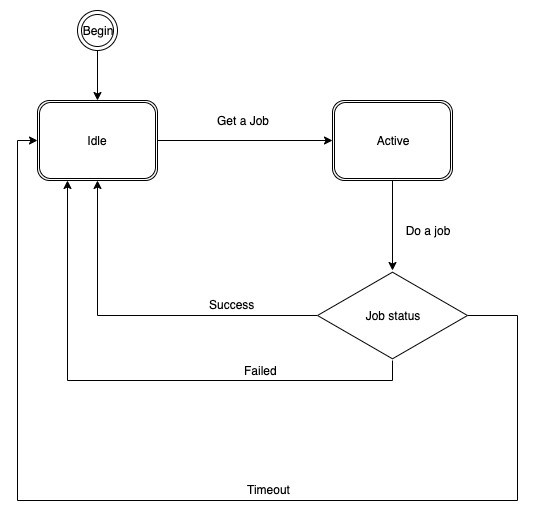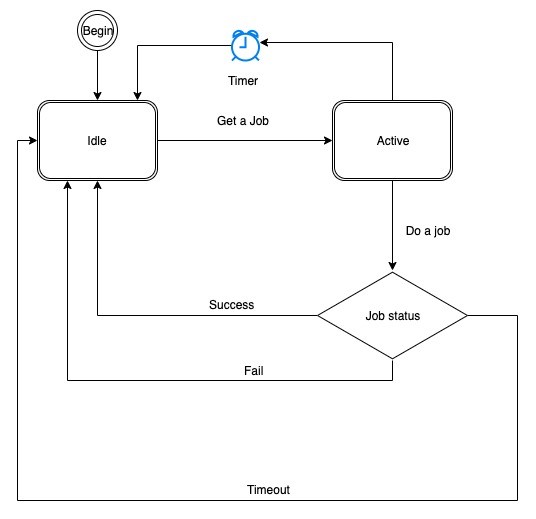
FSMActor workflow design
FSMActor is the engine of the job management. The job work flow as below:

- The ProxyActor put the request job to QueueActor
- When FSMActor in idle status, the FSMActor will retrieve job from QueueActor
- QueueActor will send the queued job to FSMActor
- FSMActor will tell ProxyActor that the job is started and ProxyActor will record which FSMActor is handle the job, FSMActor will turn to active status.
- FSMActor will send the job to JobTranslator.
- JobTranslator translate the job and send JobWorker information and job detail to FSMActor.
- FSMActor will create Jobworker and do the job using job detail
- When JobWorker finish its job, the job result will send to ProxyActor
- When ProxyActor receive the job result, ProxyActor will send message to FSMActor to ask FSMActor change status to idle to handle new job
FSMActor is a FSM(finite-state machine) Actor which only has two status, Idle and Active as below:

FSMActor start as Idle status, in that status, FSMActor will retrieve a job and change to Active status.
When job finish (Success, Fail, Timeout), the FSMActor will change from Active status to Idle Status.
def runProcessCommand(processJob:JobMsg,
backendServerOpt: Option[BackendServer] = None,
timeout: Timeout = ConstVars.longTimeOut,
priority: Option[Int] = None)
(implicit ex: ExecutionContext): Future[JobResult] = {
val backendServer = backendServerOpt match {
case Some(backendServer) => backendServer
case _ => startup(Some(seedPort))
}
val resultOpt= for( driverService<- backendServer.getActorProxy(Const.driverServiceName);
processTranService<- backendServer.getActorProxy(Const.procssTranServiceName))
yield{
val actorSystem = backendServer.actorSystemOpt.get
val receiveActor = actorSystem.actorOf(ReceiveActor.receiveActorProps, CNaming.timebasedName("Receive"))
val processJobRequest = JobRequest(processJob, receiveActor, processTranService, priority)
driverService.tell(processJobRequest, receiveActor)
val result = (receiveActor ? FetchResult()) (timeout).map {
result =>
receiveActor ! ProxyControlMsg(PoisonPill)
receiveActor ! PoisonPill
result.asInstanceOf[JobResult]
}
result
}
resultOpt.getOrElse(Future(JobResult(JobStatus.Failed, new Exception(JsError("Can't get service")))))
}
What’s the issue of the code above?
val result = (receiveActor ? FetchResult()) (timeout).map {
result =>
receiveActor ! ProxyControlMsg(PoisonPill)
receiveActor ! PoisonPill
result.asInstanceOf[JobResult]
}
Actually when timeout happened, the code can’t handle the situation. The FSMActor will not reset to Idle status.
Let handle the timeout situation via the code as below:
def runProcessCommand(processJob: JobMsg,
backendServerOpt: Option[BackendServer] = None,
timeout: Timeout = ConstVars.longTimeOut,
priority: Option[Int] = None)
(implicit ex: ExecutionContext): Future[JobResult] = {
val backendServer = getBackendServerForCommand(backendServerOpt)
val resultOpt = for (driverService <- backendServer.getActorProxy(Const.driverServiceName);
processTranService <- backendServer.getActorProxy(Const.procssTranServiceName))
yield {
val actorSystem = backendServer.actorSystemOpt.get
val receiveActor = actorSystem.actorOf(ReceiveActor.receiveActorProps, CNaming.timebasedName("Receive"))
val processJobRequest = JobRequest(processJob, receiveActor, processTranService, priority)
driverService.tell(processJobRequest, receiveActor)
implicit val timeoutValue: Timeout = timeout
var result = JobResult(JobStatus.Unknown, "Unkonwn").asInstanceOf[Any]
try {
result = Await.result((receiveActor ? FetchResult()), timeout.duration)
} catch {
case ex: Throwable =>
Logger.apply(this.getClass.getName).error(s"$processJob timeout after $timeoutValue")
result = JobResult(JobStatus.TimeOut, ex.toString)
}
receiveActor ! ProxyControlMsg(PoisonPill)
receiveActor ! PoisonPill
Future(result.asInstanceOf[JobResult])
}
resultOpt.getOrElse(Future(JobResult(JobStatus.Failed, new Exception(JsError("Can't get service")))))
}
The timeout situation will be handled, but the code changes the operation to blocked operation with Await. So we need to wrap the blocked IO with Future.
def runProcessCommand(processJob: JobMsg,
backendServerOpt: Option[BackendServer] = None,
timeout: Timeout = ConstVars.longTimeOut,
priority: Option[Int] = None)
(implicit ex: ExecutionContext): Future[JobResult] = {
val backendServer = getBackendServerForCommand(backendServerOpt)
val resultOpt = for (driverService <- backendServer.getActorProxy(Const.driverServiceName);
processTranService <- backendServer.getActorProxy(Const.procssTranServiceName))
yield {
val actorSystem = backendServer.actorSystemOpt.get
val receiveActor = actorSystem.actorOf(ReceiveActor.receiveActorProps, CNaming.timebasedName("Receive"))
val processJobRequest = JobRequest(processJob, receiveActor, processTranService, priority)
driverService.tell(processJobRequest, receiveActor)
implicit val timeoutValue: Timeout = timeout
var result = JobResult(JobStatus.Unknown, "Unkonwn").asInstanceOf[Any]
def getResult = {
implicit val timeoutValue: Timeout = timeout
try {
result = Await.result((receiveActor ? FetchResult()), timeout.duration)
} catch {
case ex: Throwable =>
Logger.apply(this.getClass.getName).error(s"$jobRequest timeout after $timeout")
result = JobResult(JobStatus.TimeOut, ex.toString)
receiveActor ! ProxyControlMsg(result)
}
receiveActor ! ProxyControlMsg(PoisonPill)
receiveActor ! PoisonPill
result.asInstanceOf[JobResult]
}
Future(getResult)
}
resultOpt.getOrElse(Future(JobResult(JobStatus.Failed, new Exception(JsError("Can't get service")))))
}
In worse case the FSMActor will not reset to timeout, and we could add one configuration which will reset the FSMActor to Idle status.

